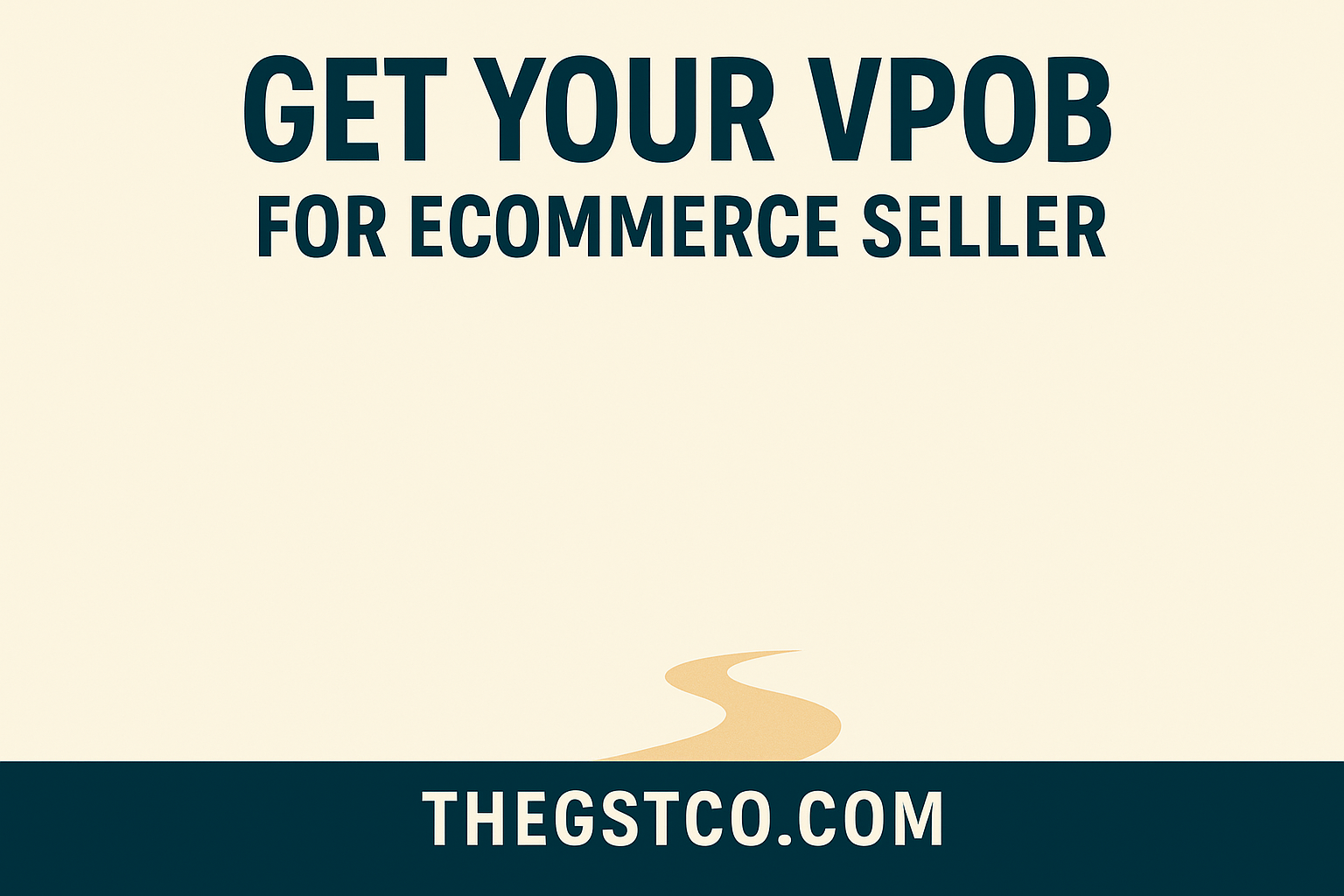
In the fast-paced world of ecommerce, businesses often face complex legal and tax compliance requirements, especially when expanding into new territories. One important concept that ecommerce sellers need to understand is VPOB — Virtual Place of Business. Whether you're an Amazon, Flipkart, Meesho, or Myntra seller in India, understanding the importance of VPOB for ecommerce seller operations can streamline your compliance and help scale your business effectively.
What is VPOB?
VPOB, or Virtual Place of Business, refers to a registered business address provided by a third-party service provider, which ecommerce sellers can use for GST registration in states where they do not have a physical office. With a VPOB, a seller can legally operate and comply with state-specific tax laws without needing to rent or own a physical location.
Why VPOB is Crucial for Ecommerce Sellers
The Goods and Services Tax (GST) regime in India requires ecommerce sellers to register for GST in every state where they have a presence or make taxable supplies. Marketplaces like Amazon, Flipkart, and others often have fulfillment centers across multiple states. To store goods in these warehouses and sell through these platforms, sellers need to be registered in those states.
Here’s where the VPOB for ecommerce seller becomes essential. It allows sellers to register in a state, list inventory in local warehouses, and comply with GST norms — all without having to establish a physical office.
Key Benefits of VPOB for Ecommerce Sellers:
Cost-Effective Expansion
Setting up physical offices across multiple states can be expensive. VPOB offers a budget-friendly alternative by allowing sellers to get GST-registered in different states using a virtual business address.
Faster Market Reach
With VPOB, sellers can store their inventory in different state warehouses and offer faster delivery options. This increases customer satisfaction and boosts sales.
Simplified Compliance
VPOB ensures sellers meet the legal requirements for inter-state ecommerce operations. This includes GST filings, warehouse compliances, and documentation.
Improved Logistics and Visibility
Multi-state presence through VPOB helps sellers list products as “Fulfilled by Amazon” or similar programs on Flipkart and other platforms. This often results in higher rankings and better visibility on marketplaces.
How to Get a VPOB for Ecommerce Seller
Several service providers in India offer VPOB for ecommerce seller services, especially for those using Amazon FBA, Flipkart Smart, or other warehousing models. Here's how the process typically works:
Step-by-Step Process:
Choose a Reliable VPOB Service Provider
Look for a service provider with experience in ecommerce compliance, multi-state registrations, and good customer support.
Select the State(s)
Based on your target market and the location of ecommerce platform warehouses (like Amazon FCs), select the states where you want to register.
Documentation and Agreement
You'll need to submit documents like your PAN, Aadhaar, business registration certificates, and sign a VPOB agreement with the service provider.
GST Registration
Using the VPOB address, you can apply for GST registration in the selected state(s). The provider may assist with filing and tracking your application.
Start Storing and Selling
Once registered, you can start storing inventory in the warehouses of platforms like Amazon, Flipkart, Meesho, and others in that state, ensuring full legal compliance.
Common Use Cases
Here are a few scenarios where a VPOB for ecommerce seller is particularly useful:
Amazon FBA Sellers: Amazon requires GST registration in the state where the fulfillment center is located. VPOB enables sellers to comply without physical presence.
Flipkart Smart Sellers: Flipkart also mandates GST registration in states where their warehouses are used.
D2C Brands Expanding to Multiple States: A D2C brand planning to distribute across multiple regions via third-party logistics (3PL) can use VPOB to ease the entry process.
Small Sellers on Meesho or GlowRoad: Even small-scale sellers who want to scale up via multi-state selling can benefit from VPOB.
Legal and Compliance Considerations
While VPOB for ecommerce seller is a powerful tool, it must be used responsibly. Sellers must ensure:
Proper filing of monthly and annual GST returns
Coordination with the VPOB service provider to receive GST notices or communication
Timely response to notices or updates from the GST department
Regular audit and reconciliation of data from multiple state registrations
Failure to comply can result in penalties, suspension of GST numbers, or being blacklisted by ecommerce platforms.
Choosing the Right VPOB Service Provider
Not all VPOB providers offer the same quality or support. When choosing a VPOB for ecommerce seller, consider the following:
Experience in multi-state ecommerce compliance
End-to-end support for GST registration and filings
Integration with ecommerce platforms
Transparent pricing with no hidden costs
Customer reviews and testimonials
Conclusion
In today’s competitive ecommerce landscape, geographical expansion is key to growth. However, regulatory hurdles like state-wise GST compliance can slow down this expansion. That’s where a VPOB for ecommerce seller comes in — offering a smart, legal, and cost-effective way to establish your presence in multiple states without investing in physical infrastructure.
Whether you're a new seller trying to expand or an experienced brand looking to optimize logistics and compliance, understanding and utilizing VPOB services can give you a significant edge. As ecommerce continues to evolve, staying compliant while scaling smartly will set successful sellers apart from the rest.















